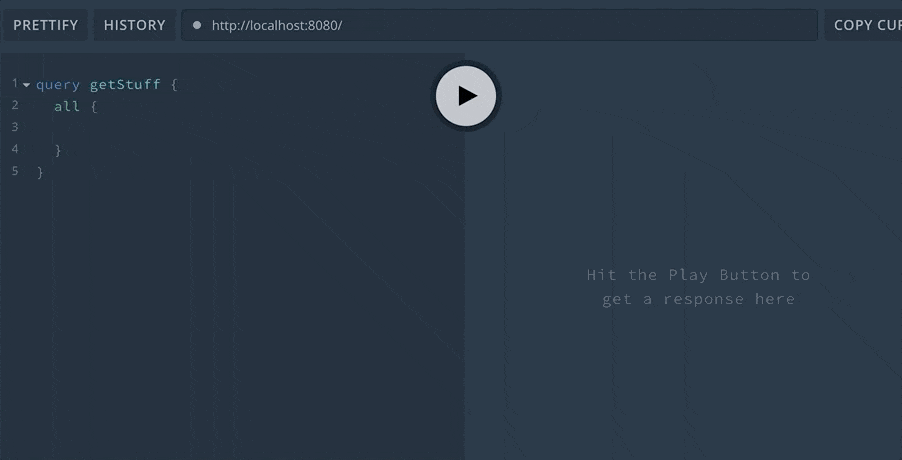qlkube / Qlkube
Programming Languages
Projects that are alternatives of or similar to Qlkube
qlkube
qlkube is a graphql api for kubernetes, allowing you to interact with all the features of the Kubernetes api using graphql.
qlkube's graphql schema is dynamically built from the openapi/swagger api specification exposed by the Kubernetes cluster it is running in - qlkube should therefore:
- expose all the types and operations from the Kubernetes rest api in its grapqhl api
- be consistent with the exact Kubernetes api version of your cluster and kept up to date if and when this changes
In addition to the directly mapped operations from the openapi spec, qlkube provides an 'all' query type that gives a more natural 'kubectl' influenced interface into the api.
qlkube ships with the Apollo GraphQL Playground, so you can play around with the api straight away.
Example Queries
The 'all' resource is the easiest query type to use for querying kubernetes resources of all types (services, pods, deployments etc). qlkube also exposes all the low-level resources autogenerated from the Kubernetes openapi/swagger api - these types are named exactly as the 'operationId' in the openapi spec, they can therefore seem quite 'low-level' and sometimes unintuitive in comparison.
Get all pods in all namespaces
This query returns the names and namespaces of all the pods in the cluster.
(here we use the more friendly 'all' type - you can perform a similar query using listCoreV1PodForAllNamespaces)
query getAllPodsInAllNamespaces {
all {
pods {
items {
metadata {
name
namespace
}
}
}
}
}
Output:
{
"data": {
"all": {
"pods": {
"items": [
{
"metadata": {
"name": "alpha-7c766f4fc7-2bh8m",
"namespace": "default"
}
},
{
"metadata": {
"name": "alpha-7c766f4fc7-hx8ml",
"namespace": "default"
}
},
{
"metadata": {
"name": "alpha-7c766f4fc7-ztpph",
"namespace": "default"
}
},
{
"metadata": {
"name": "beta-v1-597679f796-k5gn4",
"namespace": "default"
}
},
{
"metadata": {
"name": "beta-v1-597679f796-x7hsl",
"namespace": "default"
}
},
{
"metadata": {
"name": "gamma-79bc488b5b-srmxm",
"namespace": "default"
}
},
...etc
Get all pods in a specific namespace
This query returns the names, namespaces, creation times and labels of all the pods in the 'default' namespace
(here we use the more friendly 'all' type - you can perform a similar query using ioK8sApiCoreV1PodList)
query getAllPodsInDefaultNamespace {
all(namespace: "default") {
pods {
items {
metadata {
name
namespace
creationTimestamp
labels
}
}
}
}
}
Output:
{
"data": {
"all": {
"pods": {
"items": [
{
"metadata": {
"name": "alpha-7c766f4fc7-2bh8m",
"namespace": "default",
"creationTimestamp": "2019-06-03T15:07:17Z",
"labels": {
"app": "alpha",
"appKubernetesIoManagedBy": "skaffold-v0.29.0",
"appId": "github.expedia.biz_hotels_alpha",
"podTemplateHash": "7c766f4fc7",
"skaffoldDevBuilder": "local",
"skaffoldDevCleanup": "true",
"skaffoldDevDeployer": "kubectl",
"skaffoldDevDockerApiVersion": "1.39",
"skaffoldDevTagPolicy": "git-commit",
"skaffoldDevTail": "true",
"version": "v1"
}
}
},
...etc
Get all kubernetes resources with a specific label
This query gets the names of all kubernetes resources (services, deployments, pods etc) that are labelled with label 'app=alpha'
(roughly equivalent to kubectl get all -l app=alpha)
query allResourcesOfApp {
all(labelSelector:"app=alpha") {
services {
items {
metadata {
name
}
}
}
deployments {
items {
metadata {
name
}
}
}
pods {
items {
metadata {
name
}
}
}
daemonSets {
items {
metadata {
name
}
}
}
replicaSets {
items {
metadata {
name
}
}
}
statefulSets {
items {
metadata {
name
}
}
}
jobs {
items {
metadata {
name
}
}
}
cronJobs {
items {
metadata {
name
}
}
}
namespaces {
items {
metadata {
name
}
}
}
}
}
Output:
{
"data": {
"all": {
"services": {
"items": [
{
"metadata": {
"name": "alpha"
}
}
]
},
"deployments": {
"items": [
{
"metadata": {
"name": "alpha"
}
}
]
},
"pods": {
"items": [
{
"metadata": {
"name": "alpha-7c766f4fc7-2bh8m"
}
},
...etc
Example Mutations
Create namespace
This mutation creates a new 'bar' namespace. The input json is the escaped version of the following:
{
"apiVersion": "v1",
"kind": "Namespace",
"metadata": {
"name": "bar"
}
}
We output the creation timestamp for the new namesapce.
mutation createNamespace {
createCoreV1Namespace(input: "{\"apiVersion\":\"v1\",\"kind\":\"Namespace\",\"metadata\":{\"name\":\"bar\"}}") {
metadata {
creationTimestamp
}
}
}
Output:
{
"data": {
"createCoreV1Namespace": {
"metadata": {
"creationTimestamp": "2019-06-03T22:37:02Z"
}
}
}
}
Running
Quickstart
qlkube is designed to be run inside the kubernetes cluster. The included quickstart.yaml manifest should get you started:
kubectl apply -f deployments/quickstart.yaml
kubectl port-forward svc/qlkube 8080:80
Navigate to http://localhost:8080/ in your browser - this will launch the GraphQL Playground which you can use to interact with the kubernetes api.
Skaffold
The included skaffold.yaml can be used to build and deploy from source
(note that in production you may want to restrict the permissive RBAC settings in deployments/deployment.yaml).
N.B. you need skaffold installed!
skaffold dev
kubectl port-forward svc/qlkube 8080:80
Navigate to http://localhost:8080/ in your browser - this will launch the GraphQL Playground which you can use to interact with the kubernetes api.
Out of cluster (dev mode)
For playing around locally you can run qlkube from source outside of the cluster. To do this you must first proxy the Kubernetes api server to http://localhost:8001:
kubectl proxy
You can then run qlkube locally, which will connect to the proxied Kubernetes api:
npm run local
Navigate to http://localhost:8080/ in your browser - this will launch the GraphQL Playground which you can use to interact with the kubernetes api.
Schema
The generated graphql schema is served at /schema

